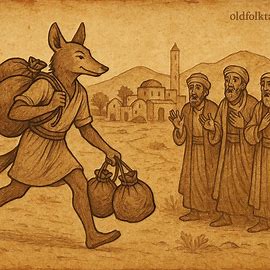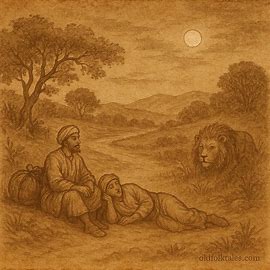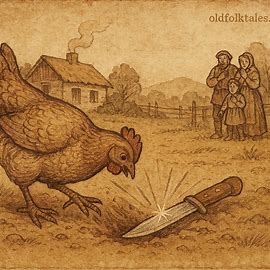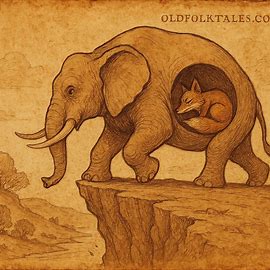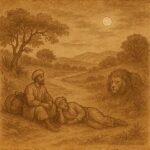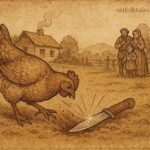In the time of old, there lived a remarkable being named Beiho, whose origins were shrouded in mystery; some said he was a man, others whispered he was a creature of the jackal family. Even before birth, Beiho’s extraordinary nature was evident. When his mother went to the water to fill her skin, she had no one to carry the heavy load. Astonishingly, Beiho emerged briefly from her womb, lifted the water-skin onto her back, and returned into the safety of her womb. When she reached home, her labor began. The women who came to assist were astonished when Beiho declared, “I shall be born by myself; do not come near my mother,” and so he did, entering the world on his own terms.
As Beiho grew, his cunning and strength became apparent. One day, he quarreled with the wives of his uncles. When his uncles visited his mother’s house, Beiho fastened an oesophagus filled with blood around his mother’s neck in secret and demanded a meal for his uncles. In a demonstration of calculated fury, he feigned violence, pressing a knife against his mother’s throat and cutting the oesophagus. His uncles, believing him dangerous, were filled with fear. Beiho explained, “If women are not treated this way, they will not act with speed and care. Your wives must understand this.” He revived his mother with a ritual incantation, astonishing his uncles, who then attempted the same with their own wives, but their wives did not rise, for they had gone too far. Bewildered, they buried their wives and swore vengeance against Beiho.
The uncles plotted to burn Beiho alive in his home. Yet he, foreseeing their intentions, took his possessions and slept elsewhere. When his house was set ablaze, Beiho carried the ashes in two leather bags, meeting the uncles on the road. “What is this?” they asked. “The ashes of my house, destined for sale in distant lands,” he replied. Later, he placed his ashes with a wealthy man for safekeeping while secretly taking the man’s treasures and gold, leaving the uncles to believe he had magically multiplied his belongings. Foolish, they burned their own houses and sold their ashes in a distant market, discovering too late that Beiho had deceived them.
Undeterred, Beiho continued to outwit his enemies. When the uncles killed his cattle in anger, he dried the hides and hid them on a hillside. Traveling merchants passing by saw the hides and fled, believing an army approached, leaving their camels and loads behind. Beiho seized the camels and their riches, returning home triumphant. His uncles, seeing his success, sought to drown him in a large pond. Yet, Beiho cleverly exchanged places with a cow-driver, tying the man in his stead. The unknowing uncles threw the man into the pond while Beiho escaped with the cattle. Believing they could replicate his fortune, they entered the pond themselves and drowned, leaving Beiho unchallenged.
Among his many exploits, Beiho set his sights on the daughter of a village chief, famed for her beauty and guarded closely by her brother. To gain access, Beiho disguised himself, having his mother braid his hair and dress him as a girl. He approached the chief’s son, convincing him to allow his “sister” into the loft. There, Beiho secretly united with the daughter, and she became pregnant. On her wedding day, the family, unaware of Beiho’s deception, substituted his own sister as the bride. After arriving at her husband’s village, Beiho’s sister demanded her due, a Dongola-steed adorned with gold, silver, and silk. Riding it, she galloped to her home, leaving the villagers astonished.
Returning to his mother, Beiho removed his disguise and retrieved his hidden treasures. He demanded his bride, now with child, from the chief’s family. Grateful for his cunning, they complied. Enraged, those who had unknowingly married his sister attempted to wage war against him, yet their schemes led to mutual destruction, erasing the families from memory. Thus, Beiho’s ingenuity, daring, and strategic cunning were immortalized in Tigrean lore.
Moral Lesson
This Tigrean folktale teaches that ingenuity and cleverness can overcome even the most dangerous obstacles. Beiho’s success lay not in brute force alone, but in his ability to anticipate, deceive, and manipulate circumstances in his favor. His story celebrates resourcefulness, daring, and the importance of thinking several steps ahead.
Yet, the tale also warns of the dangers of unchecked cunning and greed. Those who attempt to replicate Beiho’s schemes without wisdom or foresight risk ruin. True intelligence combines strategy with discernment, ensuring that cleverness is both effective and ethical.
Knowledge Check
Who was Beiho said to be?
A human or possibly a creature of the jackal family.
How did Beiho demonstrate his extraordinary nature before birth?
He briefly emerged from his mother’s womb to carry a water-skin for her.
What trick did Beiho use to protect himself from his uncles’ plan to burn him?
He slept elsewhere and carried his house’s ashes in leather bags.
How did Beiho acquire the merchants’ camels?
He tricked them into fleeing, believing an army approached.
How did Beiho gain access to the village chief’s daughter?
He disguised himself as a girl to enter the loft undetected.
What lesson does Beiho’s story convey?
Ingenuity, strategy, and cleverness can overcome challenges, but wisdom must guide cunning.
Source: Tigrean folktale, Eritrea
